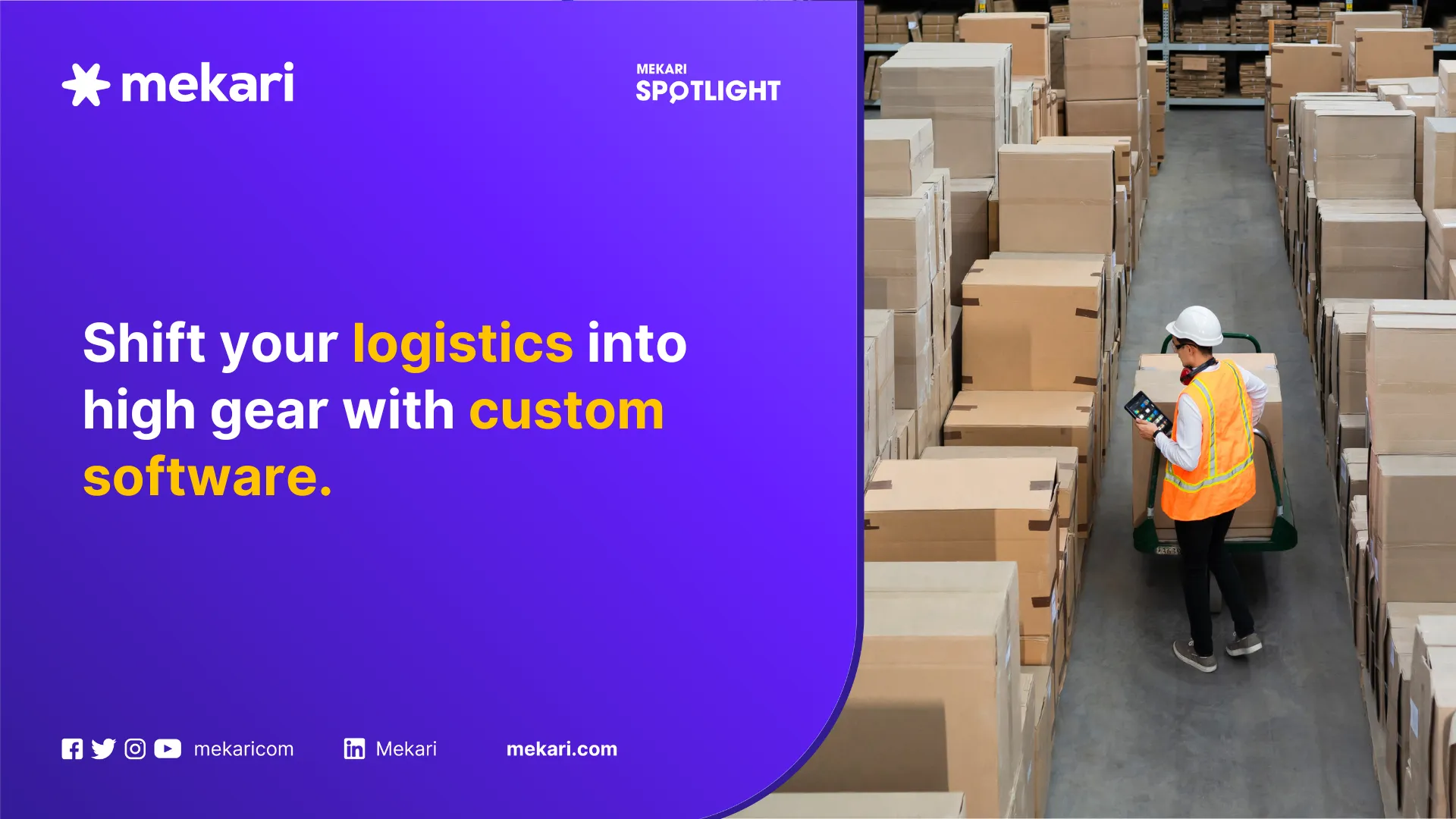Mekari Insight
- Custom logistic software development refers to the process of creating tailored software solutions designed specifically to meet the unique demands of a business’s supply chain and logistics operations.
- Custom logistics software evolves with your business, adapting to your unique operations, scaling seamlessly as you expand, and providing a competitive edge over generic solutions.
- This custom logistic solutions are capable to help companies to automate tedious tasks, optimize routes, and track shipments in real-time, all while enhancing customer satisfaction with accurate, timely updates that build trust and loyalty.
- With custom logistics software development, businesses can leverage tailored reporting and analytics to make smarter, data-driven decisions, reduce waste, and improve efficiency—ultimately saving money and boosting overall performance.
Logistics faces constant challenges—delayed shipments, inventory errors, and inefficient systems. Off-the-shelf software often doesn’t cut it.
Custom logistics software, built specifically for your needs, solves these problems by streamlining operations, improving accuracy, and scaling with your business, giving you the competitive edge.
Read more to discover how custom logistics software development can transform your business.
What is custom logistics software

Custom logistics software is a tailor-made software solution specifically designed to address the unique operational needs, workflows, and challenges of a logistics or supply chain business.
Unlike off-the-shelf or generic logistics platforms, custom logistics software is built to align perfectly with your existing operations. Moreover, this solution is also designed to be able to integrate with your existing software or ecosystem, such as CRM or ERP.
Therefore, this tailored solution can ensure seamless integration, maximum efficiency, and long-term scalability without unnecessary workarounds.
Furthermore, investing in custom logistics software development enables companies to create a system that grows with them, supports specific business rules, incorporates proprietary processes, and delivers measurable improvements in speed, cost control, and customer satisfaction.
Read More: What is SaaS Integration and How It Streamline your BusinessComponent of custom logistic software
Custom logistics software is made up of multiple connected systems that handle different parts of your supply chain. Here’s a closer look at the key components:
1. Transportation Management System (TMS)
TMS helps manage and optimize the movement of goods. This kind of custom software in logistics includes features like route planning, delivery tracking, carrier selection, and cost control to ensure faster and more affordable transportation.
2. Warehouse Management System (WMS)
Focuses on daily warehouse operations. This system allows real-time inventory tracking, streamlines picking and packing processes, assigns tasks to workers, provides performance insights, and supports multi-channel inventory coordination.
3. Order Management System (OMS)
From the moment a customer clicks “buy” to when the order arrives, OMS makes sure everything flows—automating fulfillment, syncing with inventory, and keeping everyone in the loop.
4. Inventory management system
Provides real-time visibility of stock across all locations. It helps with forecasting demand, setting low-stock alerts, managing stock transfers, and generating reports on inventory turnover and product movement.
5. Supply chain management system
Coordinates every stage of the supply chain, from sourcing materials to final delivery. It connects the dots between suppliers, production, and distribution—making sure everything arrives where it should, when it should.
6. Fleet management
If you have your own vehicles, this keeps them in check—tracking fuel use, maintenance schedules, driver performance, and delivery times.
7. Customer Relationship Management (CRM)
Helps you stay close to your customers. Log interactions, track service quality, and personalize experiences based on order history and preferences.
Read more: How SaaS CRM Transforms Sales and Boosts Results8. Analytics and reporting
No more flying blind—see what’s working and what’s not. From inventory turnover to warehouse productivity, this turns raw data into clear insights.
9. Event management tools
This custom software is useful for logistics businesses that run or attend events. Features include attendee registration with QR codes, resource scheduling, automated workflows, business matchmaking tools, and budget tracking.
10. Multi-carrier shipping software
Manages shipping across multiple carriers. It compares shipping rates, prints labels, tracks deliveries in real time, handles returns, and integrates with warehouse and inventory systems to keep data up to date.
11. Document workflow automation
Simplifies document-related processes. It can auto-capture data using OCR, manage eSignatures, generate reusable templates, track document versions, and extract important data using AI—reducing manual work and errors.
Benefits of using custom logistic software
Custom logistics software development offers a variety of benefits that can significantly improve your operations and customer experience. Here are some of the key advantages:
1. Streamlined operations
In logistics business, custom software removes the guesswork and manual errors, automating repetitive tasks and improving workflows.
With tools like custom order management systems, you can speed up the entire order process—from placement to delivery—giving customers a smoother experience and boosting satisfaction.
Read more: How to Streamline Business Operations: A Step-by-Step Guide2. Enhanced visibility and tracking
Tracking shipments and inventory is a constant challenge in logistics. Custom software makes it easy to track everything in real-time, ensuring full visibility and allowing you to share accurate updates with clients, building trust and keeping them informed.
3. Scalability and flexibility
Off-the-shelf software often struggles to keep up with your business’s growth. Custom solutions evolve with you, giving you the flexibility to scale your operations, add new services, or enter new markets as your business expands.
4. Integration with third-party systems
Your logistics operations rely on different systems—inventory, ERP, transport management. Custom software seamlessly integrates with these, allowing smooth data flow and coordination, leading to smarter decisions and improved efficiency.
5. Customized reporting and analytics
Data-driven decisions are key to growth. With custom logistics software, you can create tailored reports that give insights into everything from delivery times to inventory costs, helping you make better decisions and spot areas for improvement.
6. Cost reduction
By optimizing resources—whether it’s routes, inventory levels, or warehouse management—custom software helps reduce costs.
Automating tasks like inventory management prevents overstocking or understocking, directly saving money and improving efficiency.
Read more: How to Scale A Business with Cost Effective Strategy7. Customer satisfaction and experience
Custom software enhances the customer experience with features like real-time shipment tracking, automated alerts, and flexible delivery options.
These small touches make a big difference, increasing satisfaction and fostering long-term relationships with customers.
Custom Logistics Software Development Process
Developing tailored logistics and supply chain software follows a structured journey designed to ensure successful delivery. Here is how custom logistics software development works:
1. Idea discovery, analysis, and validation
Custom logistic software development process should begin with a deep dive into your current operations.
Teams conduct stakeholder interviews, map workflows, identify bottlenecks, inefficiencies, and pain points, and define clear goals and KPIs.
Then, collaborate with expert consultants to assess the feasibility of the project. Analyze unique requirements from existing processes that have been analyzed to identify key areas for improvement, laying a solid foundation for development.
2. Planning & Architecture Design
Once the concept and requirements are validated, the next step is to select an appropriate tech stack—often cloud-based for scalability and resource optimization.
This ensures seamless integration with ERPs, CRMs, IoT devices, or third-party carriers.
Read More: CRM & Accounting Integration: Real Use Cases & Best Software3. UI/UX Design & Prototyping
After choosing the approach, companies can start to create intuitive dashboards for dispatchers and managers, mobile-friendly apps for drivers and field teams, and role-based interfaces that reduce training time.
Wireframes, mockups, and clickable prototypes are built and validated with real users to confirm usability and workflow alignment before full coding begins.
4. Development & Quality Assurance
After everything sets, developers can start to build core features iteratively, incorporating integrations, automation, and custom logic.
Continuous testing (unit, integration, security, performance, and load) runs in parallel to catch issues early. Rigorous QA includes logistics-specific scenarios like real-time tracking under high volume or edge cases in route optimization.
Read More: Custom SaaS Development: Guide for Business Owner5. Strategic Deployment, Training & Ongoing Maintenance
Once the development and testing process finished, the custom logistic software is ready to launch–but often in phases (MVP first, then full rollout).
The development teams should provide training, data migration support, and hyper-care during go-live.
Post-launch, regular updates ensure compliance with evolving regulations, add new features, and adapt to business growth through DevOps practices and monitoring.
Choosing the right custom logistic software
When selecting custom logistics software development, two key factors stand out: integration and scalability.
- Integration ensures your software works seamlessly with your existing systems, eliminating manual data transfers and reducing errors.
- Scalability is crucial to accommodate your business’s growth, whether it’s adding new services, expanding to new markets, or handling an increased volume of transactions.
Mekari Officeless is an excellent choice for logistics companies seeking a reliable custom software solution.
Trusted by market leader JNE, Mekari Officeless offers a robust platform designed to democratize business app creation, workflow automation, and analytics for streamlining operations, enhancing visibility, and optimizing workflows.
With its seamless integration and scalable features, it’s built to grow with your business.
You can also explore innovative logistics solutions within the Mekari ecosystem to boost your operational exellence.
Ready to take your logistics operations to the next level? Explore Mekari Officeless and discover how it can transform your business.
References
Eleks. ‘’How Custom Logistics and Supply Chain Software Can Improve Efficiency and Reduce Costs’’
Softude. ‘’Why Your Business Requires a Custom Logistics Management Software’’


